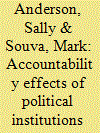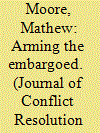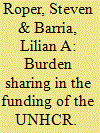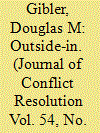| Srl | Item |
| 1 |
ID:
100944


|
|
|
|
|
| Publication |
2010.
|
| Summary/Abstract |
Selectorate theory posits that leader accountability increases with the size of the winning coalition. Recent research contends that capitalism also increases leader accountability because leaders are more dependent on the public for revenue in more capitalist economies. The authors argue that extant tests of accountability arguments of interstate conflict initiation and targeting are flawed. Accountability theories of foreign policy expect leaders to selectively initiate disputes based on their probability of winning. Accountability arguments, then, expect a conditional relationship between the accountability mechanism and the balance of power. For example, if capitalism produces peace through accountability, then more capitalist states should be less likely to initiate militarized disputes as their power advantage decreases. The authors find that this is not the case. At the same time, the authors find robust support for selectorate theory's contention that larger winning coalitions are more selective about using military force. Political institutions induce accountability; capitalism does not.
|
|
|
|
|
|
|
|
|
|
|
|
|
|
|
|
| 2 |
ID:
100947


|
|
|
|
|
| Publication |
2010.
|
| Summary/Abstract |
Nearly every international arms embargo has been systemically violated by arms exporting states. Although much work has been done exploring why states transfer arms, little has been done to answer the question of why states choose to violate arms embargoes. Earlier studies have found that states transfer arms to one another for a variety of economic and strategic reasons. This study constructs a time series cross-section data set to test whether the same interests that drive dyadic arms transfers also influence the likelihood and size of arms embargo violations. Using a two-stage model of dyadic arms transfers, this study finds that measures for arms import dependence and alliance portfolio similarity best predict the likelihood and size of arms embargo violations. These results provide evidence that state decisions to violate embargoes are driven by political interests more than economic interests.
|
|
|
|
|
|
|
|
|
|
|
|
|
|
|
|
| 3 |
ID:
100948


|
|
|
|
|
| Publication |
2010.
|
| Summary/Abstract |
The authors apply the theory of collective action and alliance behavior first developed by Olson and Zeckhauser and later extended by Sandler in a series of studies to test whether the nature of refugee protection influences state motivations to provide contributions. The authors investigate whether refugee protection can be viewed as a pure public good with the concomitant problem of free riding leading to suboptimal outcomes or whether contributions provide states private benefits that transform the nature of the good. Using a Heckman selection model, they test for the determinants of state contributions to the United Nations High Commissioner for Refugees and find that refugee protection offers several private benefits, indicating that it is best understood as an impure public good. They conclude, however, that even when states are able to secure these private benefits, it does not necessarily lead to the optimal provision of refugee protection.
|
|
|
|
|
|
|
|
|
|
|
|
|
|
|
|
| 4 |
ID:
100949


|
|
|
|
|
| Publication |
2010.
|
| Summary/Abstract |
This study presents an analytical model of budget allocation into military and civilian expenditures within an arms race between two rival countries and compares the consequences of shortsighted (period-by-period) planning versus forward-looking (long-term) planning. The authors show that although shortsighted planning is favorable for both countries, they are likely to be locked in a prisoner's dilemma in which both overinvest in arms procurement. The likelihood of overinvestment in arms procurement is higher when the perceived benefit from security is higher and when future benefits from existing arms stocks are ''high''; that is, when the rate of technology improvement over time is lower, the depreciation rate of existing arms is lower and the discount factor is higher. A dynamic version of Kagan et al., employing real-world data, finds evidence for the existence of a prisoner's dilemma in the Israeli-Syrian arms race.
|
|
|
|
|
|
|
|
|
|
|
|
|
|
|
|
| 5 |
ID:
100946


|
|
|
|
|
| Publication |
2010.
|
| Summary/Abstract |
If trade affects the costs of conflict, does it also influence the likelihood of mediation attempts? This article argues that dense bilateral trade between antagonists yields high opportunity costs since it is expensive to seek alternative markets and the belligerents will be highly vulnerable to sanctions from their counterpart. This creates incentives for combatants to limit hostility and settle conflicts through mediation. By contrast, the extent to which belligerents trade with other states decreases the likelihood of mediation since antagonists with alternative partners can mitigate the consequences of sanctions and substitute for markets, which may be at risk or even lost because of the outbreak of a dispute. The divergent effects of different trade ties imply that the impact of bilateral trade on the prospects for mediation should vary conditional on countries' trade with states outside the dyad and vice versa. This article demonstrates that this is partially valid.
|
|
|
|
|
|
|
|
|
|
|
|
|
|
|
|
| 6 |
ID:
100942


|
|
|
|
|
| Publication |
2010.
|
| Summary/Abstract |
Although centralization is thought to be a common response to external threats to the state, few theories develop the mechanisms by which domestic centralization occurs. Fewer still consistently demonstrate that centralization is indeed a common response to external threats in all states. This article therefore develops a comprehensive theory of domestic change in the shadow of external threat. Salient threats to the state create strong incentives for opposition forces to support the leader in power, even in non-democracies. The leadership then uses these favorable domestic political climates to decrease the number of institutional veto points that can stop future leader-driven policy changes. Collectively, this two-part theory provides a unified model of domestic behavioral change (also known as rally effects) and institutional centralization (defined by a declining number of veto players). In addition, by defining salient threats as challenges to homeland territory, the article provides some of the first domestic-level evidence that territorial disputes are fundamentally different from other types of international conflicts.
|
|
|
|
|
|
|
|
|
|
|
|
|
|
|
|